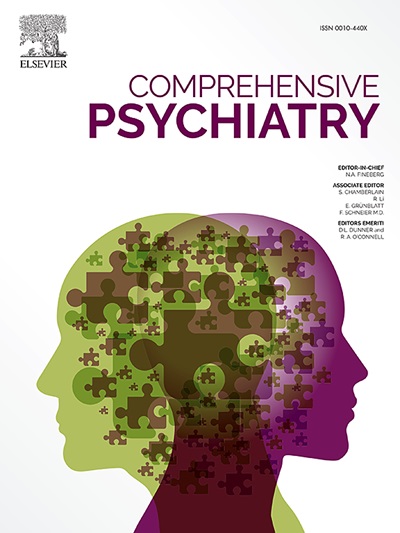Contingency-based flexibility mechanisms through a reinforcement learning model in adults with attention-deficit/hyperactivity disorder and obsessive-compulsive disorder
IF 4.2
2区 医学
Q1 PSYCHIATRY
引用次数: 0
Abstract
Background and aims
Impaired cognitive flexibility is associated with the characteristic symptomatology of ADHD and OCD. However, the mechanisms underlying learning and flexibility under uncertainty in adults with OCD or ADHD remain unclear. This study aimed to identify the mechanisms underlying contingency-based flexibility in a sample of adults with ADHD or OCD, using probabilistic learning reversal task, functional near-infrared spectroscopy, and computational modelling.
Methods
148 Spanish-speaking adults (43 OCD, 53 ADHD and 52 healthy controls) completed a probabilistic learning reversal task. Previously, we obtained a resting-state functional connectivity (rsFC) record between several frontoparietal network regions using functional near-infrared spectroscopy. Contingency-based flexibility was explored by reinforcement learning model in combination with a Bayesian Generalized Logistic Model (GLM). The reinforcement learning parameters included reward and punishment learning rates (feedback sensitivity), and inverse temperature (decision consistency). Bayesian GLM parameters were defined to measure final accuracy, learning and speed of learning.
Results
We found that the groups showed optimal performance in the discrimination block and a higher performance of healthy controls compared to patients in the reversal block. Model parameters predicted task performance differently by phase and group. In the discrimination block, while the performance of healthy controls was predicted by a combination of parameters such as high inverse temperature and punishment learning rate together with low values of reward learning rate, in the case of the clinical groups it was only by high inverse temperature. In the reversal block, the performance of OCD was predicted by high punishment learning rate and that of ADHD by low reward learning rate; in contrast, the performance of healthy controls was also predicted by a combination of parameters with high punishment learning rate and inverse temperature as predictors. We found the rsFC between the left and right posterior parietal cortex appears to credibly predict performance in the discrimination block in healthy controls.
Conclusions
These results suggest that OCD and ADHD in adults could be associated with poor behavioral adaptation when reinforcement-punishment contingencies changed. The difficulties observed in ADHD and OCD likely stem from different underlying mechanisms that affect both learning and switching processes. Findings highlighted how OCD appears to show greater sensitivity to punishment when there is uncertainty about the behavior-outcome association. Instead, the ADHD group can be guided by sensitivity to reinforcement. Interhemispheric rsFC posterior parietal cortex could be important for optimal learning of the task.

成人注意缺陷/多动障碍和强迫症的强化学习模型中基于权变的灵活性机制。
背景和目的:认知灵活性受损与ADHD和OCD的特征性症状有关。然而,成人强迫症或多动症在不确定性下的学习和灵活性机制尚不清楚。本研究旨在利用概率学习逆转任务、功能近红外光谱和计算模型,确定成人ADHD或OCD样本中基于偶然性的灵活性的机制。方法:148名说西班牙语的成年人(强迫症43人,多动症53人,健康对照52人)完成了一个概率学习逆转任务。在此之前,我们利用功能近红外光谱获得了几个额顶叶网络区域之间的静息状态功能连接(rsFC)记录。采用强化学习模型和贝叶斯广义逻辑模型(GLM)相结合的方法探讨了基于权变的柔性。强化学习参数包括奖惩学习率(反馈敏感性)和逆温度(决策一致性)。定义贝叶斯GLM参数来衡量最终的准确率、学习和学习速度。结果:我们发现两组在辨别区表现最佳,健康对照组在逆转区表现更好。模型参数对任务绩效的预测在不同阶段和组间存在差异。在辨别块中,健康对照组的表现是通过高逆温度和惩罚学习率以及低奖励学习率等参数的组合来预测的,而在临床组中,仅通过高逆温度来预测。在逆转块中,强迫症的表现由高惩罚学习率预测,ADHD的表现由低奖励学习率预测;相比之下,健康对照组的表现也由高惩罚学习率和逆温度作为预测因子的参数组合来预测。我们发现,左右后顶叶皮层之间的rsFC似乎可以可靠地预测健康对照中辨别块的表现。结论:这些结果表明,当强化-惩罚偶发发生变化时,成人强迫症和多动症可能与行为适应不良有关。在ADHD和OCD中观察到的困难可能源于影响学习和转换过程的不同潜在机制。研究结果强调了当行为与结果的关联不确定时,强迫症对惩罚表现出更大的敏感性。相反,ADHD组可以通过对强化的敏感性来指导。脑内rsFC后顶叶皮层可能对任务的最佳学习很重要。
本文章由计算机程序翻译,如有差异,请以英文原文为准。
求助全文
约1分钟内获得全文
求助全文
来源期刊

Comprehensive psychiatry
医学-精神病学
CiteScore
12.50
自引率
1.40%
发文量
64
审稿时长
29 days
期刊介绍:
"Comprehensive Psychiatry" is an open access, peer-reviewed journal dedicated to the field of psychiatry and mental health. Its primary mission is to share the latest advancements in knowledge to enhance patient care and deepen the understanding of mental illnesses. The journal is supported by a diverse team of international editors and peer reviewers, ensuring the publication of high-quality research with a strong focus on clinical relevance and the implications for psychopathology.
"Comprehensive Psychiatry" encourages authors to present their research in an accessible manner, facilitating engagement with clinicians, policymakers, and the broader public. By embracing an open access policy, the journal aims to maximize the global impact of its content, making it readily available to a wide audience and fostering scientific collaboration and public awareness beyond the traditional academic community. This approach is designed to promote a more inclusive and informed dialogue on mental health, contributing to the overall progress in the field.
 求助内容:
求助内容: 应助结果提醒方式:
应助结果提醒方式:


